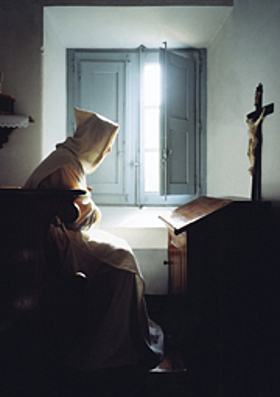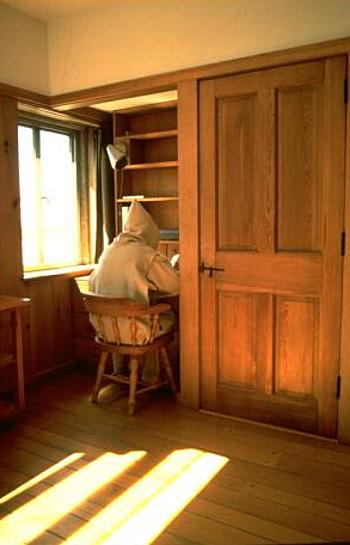|
Carthusian Monks
Life in Cell
A Life of Prayer
But whatever he does, all is directly or indirectly orientated to the contemplative life. At
the oratory he recites both the canonical office and that of the Blessed Virgin; this, occurring at fixed times throughout
the day, establishes his mind and heart in God, orientating his whole life to attention, love and union with Him. His time
of mental prayer strengthens this fundamental direction of his life, a prayer he continues in a simple but real way throughout
the day. His studies, which he pursues in virtue of the priesthood he may still be preparing for, are conceived as offering
a necessary foundation for the contemplative life.

"For they are mistaken," the Statutes read, "who think that they can easily attain to interior union with God, while
previously having neglected the study of the word of God, or later abandoning it altogether." The priesthood itself is envisaged
in its monastic and contemplative dimension. Except for limited priestly service necessary to the community and vocational
retreatants, there is no ministry attached to the Carthusian priesthood. It is rather a means of greater conformity to Jesus,
the High Priest, and unites him in a special and sacramental way to His life of prayer and sacrifice.

Likewise manual work, whether it be gardening in the summer, wood-splitting for his stove in the winter or other solitary
occupations suitable to the contemplative life, is a way not only of observing the common law of work enjoined on all men,
but also a way of reposing the spirit otherwise too easily fatigued from the rather intense life of prayer, and bringing the
body and mind better under control. The fasts and abstinences are also viewed as ways of following Christ in the desert, so
that by restraining the desires of the body, the mind may be the more disposed for and enflamed with the life of God within.
Solitude itself is a principal organ of the contemplative life, for by restricting contact with others and the ability to
move about as one wills, the mind, and indeed the whole direction of the hermit's life, is stabilized on the "one thing necessary."
It is in the same way that the other austerities must be viewed. For example, there are no radios or television in the monastery.
No newspapers circulate; it is for the Prior to communicate to the community what is judged important in the way of news.
Letter writing and visits are normally restricted to the immediate family, and these are infrequent. These and other austerities
are properly understood only if seen as effective means for drawing the monk to God and allowing God to become the very center
of his life and enter that life ever more profoundly.

As the Statutes read: "humbly, and with eagerness, the monks carry out all the tasks that a
poor and solitary life demands, but in such a way that everything is ordered to that ministry of divine contemplation to which
they are wholly dedicated." For this reason the austerities themselves are not burdensome, assumed as they are into the monk's
primary endeavor.
Charterhouse of the Transfiguration
Vocational Booklet - 1987
Life in Cell - A Life of Prayer
Solitude
Carthusian Life
Top of Page
|
